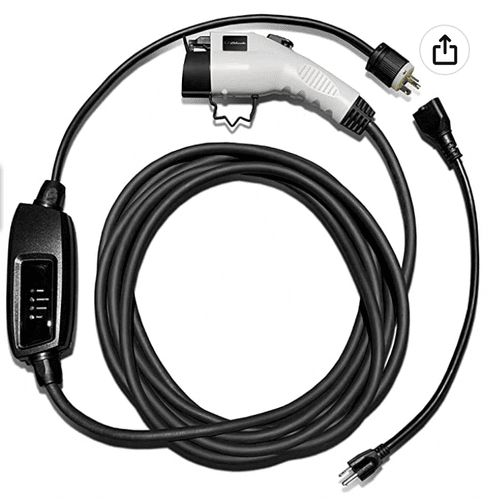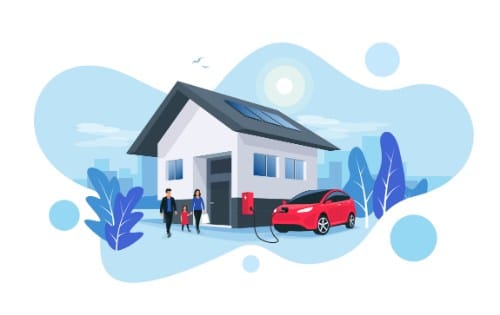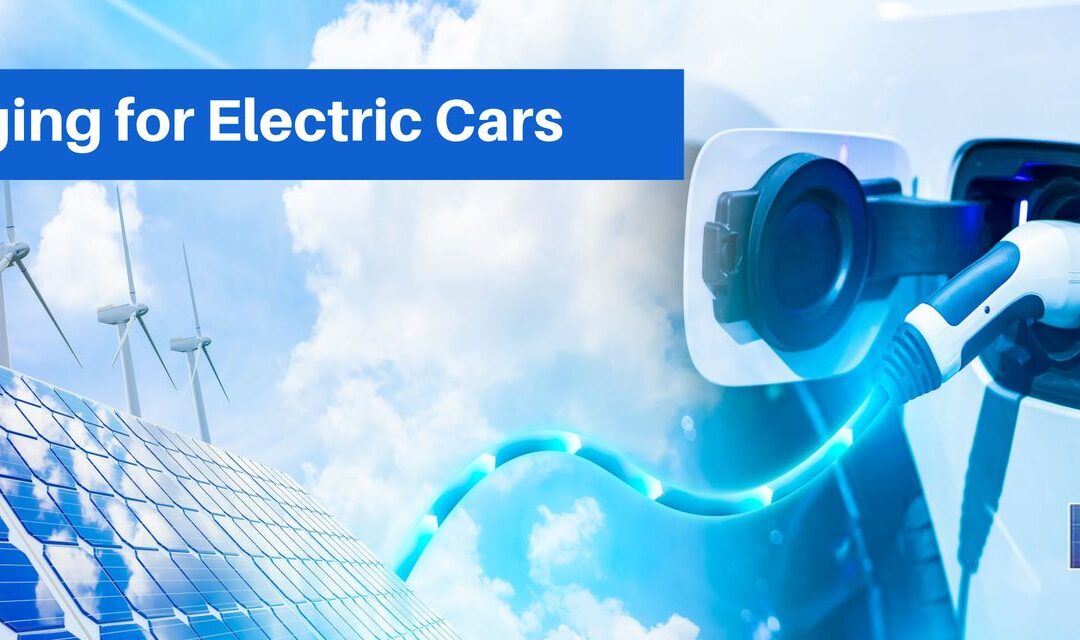If you drive an electric car, you are probably well aware of its benefits. Electric cars protect you from rising gasoline prices and are better for the environment.
But you’re still relying on the energy grid for electricity to charge your vehicle, which can be costly.
That’s why a solar charger for your electric car (EV solar charging) is a great idea. If you are interested in solar charging your EV, then read on. Below we cover everything you need to know about using solar power to charge your electric car.
Can You Charge an Electric Car With Solar Power?
Yes, you can charge an electric car with solar power. Doing so will save you money in the long run versus charging using the electric utility grid.
You have a couple of options when charging your EV with solar power. You can use a dedicated solar charger or connect an ordinary car charger to a solar system.
Understanding how this works helps to know the components of a standard solar power system. Each solar system typically includes:
● Solar Panels: consist of photovoltaic (PV) cells that convert light to DC electricity.
● Inverter: converts DC electricity to the AC electricity that EVs use.
● Electric Vehicle Supply Equipment (EVSE): includes the user interface, software, electrical conductors, and protocols that deliver electricity from the inverter to your vehicle’s battery.
● Battery Storage System: stores the electricity that solar panels produce. This allows for low-cost solar energy to be used at night when the Sun is down.
With a dedicated solar charger, all of this is can be included in one integrated system.
Alternatively, if you already have a home solar panel system, you can connect your home solar and electrical system to an electric car charger.
How Many Solar Panels Do I Need To Charge My Electric Car?
The number of solar panels you’ll need to charge your EV depends on how often you drive, your vehicle’s efficiency, how much sunlight your home receives, and the type of panels you plan to use.
As a rough estimate, you’ll probably need somewhere between 6 and 12 solar panels to charge your electric car. But, you can get a more exact estimate by using www.fueleconomy.gov.
On fueleconomy.gov, you can look up the make and model of your electric vehicle. The website will provide your car’s MPGe (miles per gallon of electricity) and the kWh needed to drive 100 miles.
For example, a 2021 Tesla Model 3 Standard Range plus RWD needs 23.7 kWh to travel 100 miles.
So, if you drive about 1200 miles per month, you can figure out your electricity needs as follows:
23.7 kWh/ 100 miles x 1200 miles per month = 284.4 kWh
That means you need 284.4 kWh per month from your solar panel system to power your electric vehicle.
On average, a single 380-watt solar panel can generate about 45 kWh per month, but that number fluctuates based on where you live and the type of panel you use.
The fluctuations make it hard to say exactly how many panels you’ll need to power your EV.
But, in our example, you’d need about six 380-watt solar panels (284.4 kWh/45 kWh per panel = 6.32 solar panels rated 380 watts each).

Is There a Portable Charger for Electric Cars?
Yes, there are portable chargers for electric cars. They usually plug into an outlet at home to fill. Then, you can take them with you in the trunk of your vehicle.
These portable charging options are mainly for emergency purposes. They’ll extend the range of your car by somewhere between ten and forty miles, maybe a little more, but aren’t for regular use.
Alternatively, a few companies are launching “charging as a service” models in the next year or two. Some of these work like AAA roadside assistance, but for portable charging. You pay a subscription fee, and they, in turn, promise to provide a portable charger when you need it.
Others promise to use robotics to offer portable charging within parking garages. Unfortunately, both options still have some issues to work through, and neither is widely available.
But What About Portable Solar Chargers?
You’ve seen portable solar chargers for phones, tablets, and laptops. They’re usually small batteries hooked up to a single solar panel and work great for camping or other off-grid activities. But is there a portable solar charger for an EV?
The answer is no. While there could be one day, today’s technology doesn’t support portable solar charging for EVs. Even onboard solar panels wouldn’t do the trick just yet.
To charge using a portable solar system would take far too long. We’re talking hundreds of hours, and you’d need lots of solar panels. So, it’s not practical now, but it could be someday.
How Much Does a Solar Car Charger Cost?
The cost of a solar car charger will vary significantly by the type of solar system you need.
EV Chargers with Existing Solar Array
If you already have a home solar system, you’re one step ahead.
You will need a Level 2 EV charging station professionally installed in your home. You can then charge your EV using solar energy during the day.
A solar battery storage system is needed to charge your EV at home at night using stored solar energy.
Purchasing and setting up an EV charger will likely cost you between $2k and $3k, but that cost can vary based on several factors, such as whether trenching is necessary for installation.
Your EV charging will consume electricity from your existing solar power system that your home otherwise would have used. As such, you will likely need to install additional solar panels to provide the power needed by the whole home.
Integrated Solar Chargers
An integrated solar charger includes the inverter and charger together. So, you won’t have to install an inverter, wiring, conduit, or circuit breakers separately. You’ll only need to add solar panels.
However, they also may not connect easily to an existing system. So, they’re a great option for homes that don’t have a current solar energy system but are considering one.
Integrated options vary greatly in style and price. Some can supplement utility grid power to improve charging times. Others work purely off of solar energy. You can expect them to cost $1-$2k or more, depending on the style you need.
Why Use Solar Panels To Charge Your Electric Car?
Solar panels are an excellent option for charging your electric vehicle if you care about saving money, greater reliability, and helping the environment while you’re at it.
Low Cost
Solar panel charging costs money upfront. You’ll need to install an integrated system or connect to your existing solar panels, which can be pricey.
However, solar power is typically much less expensive in the long run. Solar power is an excellent cost-saving alternative because energy costs for grid power are predicted to rise every year.
More Reliable
The sun isn’t going anywhere anytime soon. Sure, there are cloudy days, but a combination solar panel & battery system is a reliable energy source.
The energy grid has become more unreliable over the years and has been experiencing sustained outages throughout the country.
A solar-powered system with batteries to charge your EV at anytime can protect you from those utility power outages and rising electric-rate costs.
Better For The Environment
Many people purchase electric vehicles for a better environmental footprint. But if you’re charging your EV using the grid, you still rely on coal and gas-powered energy.
Solar panels allow you to use an entirely clean energy source to power your electric car. You’ll be taking power from the sun rather than fossil fuels, significantly reducing your carbon footprint.
Does SDG&E provide electric utility plans for EVs using home solar power?
Yes, SDG&E EV Time-of-Use pricing plans are specifically designed for homes with one or more Electric Vehicles (EVs).
Most commonly, EVs are charged at home during the evening hours when it’s dark and no solar energy is generated.
If the home does not have solar batteries to store energy at night, then that home will use utility grid electricity to charge the EV(s).
SDG&E’s EV Time-of-Use pricing plans have lower rates during the late evening hours than during the day. This lets you charge your EVs for less while you sleep.
They currently offer two electric vehicle utility rate plans; EV-TOU-2 and EV-TOU-5. Each provides electric rate savings during off-peak times of the day, plus super savings on weekends and holidays.
The EV-TOU-5 offers lower electric rates but has a higher monthly fee.
SDG&E offers a calculator to determine which plan is best for your EV and usage.

Summary
A solar charger for your electric car (EV solar charging) is a great idea. It allows you to end your reliance on the high-cost fossil-fuel-powered energy grid. That means cheaper energy with a smaller carbon footprint.
Solar power chargers may not cost as much as you think to install. Today’s technology makes using solar energy attainable for most electric car owners.
[2025 update] EV charging stations are eligible for federal income tax credits until Dec. 31, 2025.
Contact us to get a free solar energy system analysis or EV charging station estimate.
We’re here to answer all of your questions and help you calculate if solar power for your electric vehicle is a wise choice in your situation.
- 2025 Federal Tax Credit Changes For Solar Panel Systems & Solar Batteries - July 8, 2025
- How Solar Batteries Work - March 4, 2024
- Solar Battery or Generator for Emergency Backup Power? - January 30, 2024





